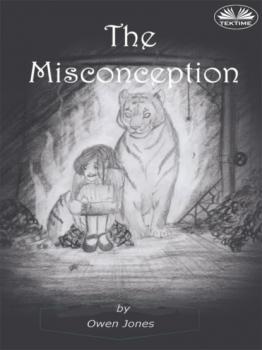ТОП просматриваемых книг сайта:
Owen Jones
Список книг автора Owen JonesАннотация
Muchas personas creen que la ira en la población mundial está aumentando a una taza alarmante. Se han propuesto diversos motivos como la causa de este fenómeno: la violencia en los programas de televisión y las películas; el uso de sustancias químicas y aditivos en los alimentos procesados; la fumigación de cultivos; las estelas químicas producidas por las aeronaves; el abuso en el consumo del alcohol y otras substancias; la disminución del autocontrol; el creer menos en Dios; la falta de respeto hacia las figuras de autoridad tradicionales; entre mucho otros. Muchas personas creen que la ira en la población mundial está aumentando a una taza alarmante. Se han propuesto diversos motivos como la causa de este fenómeno: la violencia en los programas de televisión y las películas; el uso de sustancias químicas y aditivos en los alimentos procesados; la fumigación de cultivos; las estelas químicas producidas por las aeronaves; el abuso en el consumo del alcohol y otras substancias; la disminución del autocontrol; el creer menos en Dios; la falta de respeto hacia las figuras de autoridad tradicionales; entre mucho otros. Vale la pena mirar de cerca al enojo y la agresión para lograr tener una comprensión más profunda de los arrebatos emocionales que requieren con frecuencia la aplicación de técnicas para el control de la ira. La frustración es la causa principal de la ira. Sin embargo, esta no aparece de la noche a la mañana; más bien se presenta cuando los temas de fondo le hacen surgir. Por tanto, la frustración es un sentimiento o estado profundo y continuo de insatisfacción y de falta de confianza que surge de agravios no resueltos o de necesidades y deseos no cumplidos. Este pequeño libro trata brevemente estos temas. Su propósito principal es mostrar cómo conseguir ayuda, especialmente a quienes les inquiete el tema de la ira. Los artículos presentados aquí pueden ser utilizados también en las publicaciones propias de la persona que lo haya adquirido.
Аннотация
Daddy's Hobby Het verhaal van Lek, een Thais barmeisje in Pattaya, Thailand Achter de glimlach Boek 1. Door Owen Jones. Lek is als oudste kind van vier in een typische rijstboeren familie geboren. Ze had niet verwacht dat ze iets anders zou doen dan de andere meisjes uit haar klas in de noordelijke rijstgordel van Thailand. Een typisch leven zou zijn: werken in de velden voor een paar jaar, een paar baby's krijgen, de baby's aan mama geven om voor te zorgen en weer aan het werk tot haar kinderen hun eigen kinderen zouden krijgen, en het haar beurt zou zijn om te stoppen met werken om voor hen te zorgen. Op een dag gebeurde er echter iets wat haar hele leven veranderde – haar vader stierf jong en met enorme schulden waar de familie niets van wist. Lek was twintig jaar oud en zij was de enige die inbeslagneming kon voorkomen. De enige manier was om in de bar van haar nicht in Pattaya te gaan werken. Ze besloot als serveerster aan het werk te gaan, maar toen ze zich realiseerde dat ze zwanger was van haar waardeloze, vervreemde echtgenoot, moest er iets veranderen. Ze kreeg de baby, gaf haar aan haar moeder om voor te zorgen, en ging weer aan het werk. Maar nu had ze echt geld nodig om haar kind een beter leven te geven. Ze dreef de toeristische seksindustrie binnen. Het boek vertelt enkele van haar 'avonturen', haar dromen en nachtmerries en haar 'modus operandi'. Het probeert te laten zien, vanuit Lek's oogpunt, hoe het echt is om een Thais barmeisje te zijn – de hoop en frustraties, teleurstellingen, leugens en bedrog die deel uitmaken van haar dagelijks leven. Op een dag ontmoet ze een man die ze leuk vindt en hij vindt haar ook leuk. Niets nieuws, het was honderden keren eerder gebeurd, maar ze voelt dat het deze keer anders is. Ze brengen vier weken samen door, en dan gaat hij naar huis – zoals alle mannen voor hem, liet hij beloftes en hoop achter. Hij komt terug, maar het echte leven met een echte vriend is niet zo makkelijk als ze had gedroomd. Ze maken goede en slechte tijden mee, maar blijven ze bij elkaar en voor hoe lang? Zal ze na alles wat ze heeft meegemaakt, in staat zijn om weer een gewone vriendin of zelfs een vrouw te zijn? Zal ze ooit nog eens echt in staat zijn om een man genoeg te vertrouwen? Of zou ze er beter aan doen om haar dromen op te geven en verder te werken in de bar? Wees voorzichtig met wat je wenst, Lek.. Achter de glimlach verwijst naar het feit dat Thailand wereldwijd bekend staat als 'het land van de glimlach'.
Аннотация
Lek nació como la hija mayor de cuatro en una familia típica de productores de arroz. No esperaba hacer nada diferente de las otras chicas de su clase en el cinturón de arroz del norte de Tailandia. Normalmente eso sería: trabajar en el campo durante algunos años; tener algunos bebés; dárselos a mamá para que los cuide y volver a trabajar hasta que sus hijos tengan sus propios hijos y ella pueda dejar de trabajar para cuidarlos. Un día ocurrió una catástrofe inesperada: su padre murió joven y con enormes deudas de las que la familia no sabía nada. Lek tenía veinte años y era la única que podía evitar la ejecución hipotecaria. Sin embargo, la única forma que conocía era ir a trabajar al bar de su prima en Pattaya. Fue como mesera y cajera, pero cuando se dio cuenta de que estaba embarazada de su inútil y separado esposo, las cosas tuvieron que cambiar. Tuvo el bebé, se lo dio a su madre para que lo cuidara y volvió a trabajar. Sin embargo, ahora necesitaba dinero real para proporcionar una vida mejor a su hija y compensar el gasto de toda su juventud a 500 millas de distancia. Se metió en la industria del sexo turístico. El libro relata algunas de sus ”aventuras”, sus sueños y pesadillas y su ”modus operandi”. Intenta mostrar, desde el punto de vista de Lek, lo que realmente es ser una chica tailandesa de bar : las esperanzas y frustraciones, las esperanzas y las decepciones, las esperanzas y las mentiras y engaños que forman parte de ella todos los días de su vida. Un día conoce a un hombre que le gusta y ella también le gusta. Nada nuevo allí, había sucedido cientos de veces, pero ella siente que es diferente. Pasan cuatro semanas maravillosas juntos y luego él se va a casa, como todos lo habían hecho, dejando más promesas y más esperanzas. Este regresa, pero la vida real con un novio de verdad no es tan fácil como había soñado que sería. Pasan por buenos y malos momentos, pero ¿permanecerán juntos y por cuánto tiempo? Después de todo lo que ha pasado, ¿podrá volver a ser una novia normal o incluso una esposa? ¿Podrá alguna vez volver a confiar lo suficiente en un hombre? ¿O sería mejor que renunciara a sus sueños y siguiera trabajando en el bar? Lek comienza a descubrir que conseguir lo que desea no siempre es tan bueno como pensaba. ”Detrás de la sonrisa” se refiere al hecho de que Tailandia es conocida en todo el mundo como ”La tierra de las sonrisas”.
Аннотация
Lek was born the eldest child of four in a typical rice farming family. She did not expect to do anything any different from the other girls in her class in the northern rice belt of Thailand. Typically that would be: work in the fields for a few years; have a few babies; give them to mum to take care of and back to work until her kids had their own children and she could stop working to take care of them. One day a catastrophe occurred out of the blue – her father died young and with huge debts that the family knew nothing about. Lek was twenty and she was the only one who could prevent foreclosure. However, the only way she knew was to go to work in her cousin’s bar in Pattaya. She went as a waitress-cum-cashier, but when she realised that she was pregnant by her worthless, estranged husband, things had to change. She had the baby, gave it to her mother to look after and went back to work. However, now she needed real money to provide a better life for her child and to make up for spending its whole youth 500 miles away. She drifted into the tourist sex industry. The book relates some of her ‘adventures’, her dreams and nightmares and her ‘modus operandi’. It tries to show, from Lek’s point of view, what it really is like to be a Thai bar girl – the hopes and frustrations, the hopes and the let-downs, the hopes and the lies and deceit that are part of her every day life. One day she meets a man she likes and he likes her too. Nothing new there, it had happened hundreds of times, but she feels that it is different. They have a wonderful four weeks together and then he goes home – as they all had, leaving more promises and more hopes. This one returns, but real life with a real boyfriend is not as easy as she had dreamed it would be. They go through good and bad times, but will they stay together and for how long? After all she has been through, will she be able to be a regular girlfriend or even a wife again? Will she ever really be able to trust a man enough again either? Or would she be better off giving up her dreams and carrying on working in the bar? Lek begins to find out that getting what you wish for is not always as good as you thought it would be. 'Behind The Smile' refers to the fact that Thailand is known the world over as 'The Land of Smiles'.
Аннотация
Daisy's Chain Love, Intrigue and the Underworld on The Costa del Sol Daisy, the proud daughter of a wealthy ex-London gangster, John, and his Spanish wife, Teresa, grew up in Marbella on the Costa del Sol, aka, the Costa del Crime. She idolised her parents and sought to impress her ageing father by helping him run the family businesses after uni. However, a disastrous error of judgement ends in family tragedy, and her mother puts Daisy on a safer path of helping the local community as a penance. Daisy's Chain is a tragic tale with a pleasantly happy ending. Daisy's Chain – Synopsis John is a wealthy, single, ex-London East End gangster living on the Costa de Sol in southern Spain. The press have long called it the 'Costa del Crime', but he doesn't care as long as his quiet life is preserved. He has had enough of gang warfare. One day, his housekeeper and lover, Terri, announces she is pregnant – something they thought impossible because of their ages, John likes the idea of becoming a first-time father , so he marries Terri, and Daisy is born. He loves her, but has little time because of his business commitments. Never sure whether her father really loves her, she grows up trying to impress him, especially after hearing of his former hard-man reputation. After university, she begins to take over her father's businesses, However, she becomes ever more outrageous, until one day, she goes too far, landing her parents in hospital after a revenge attack on them from rivals, which she had caused by imprisoning and torturing one of their men. John dies from his injuries; Terri is badly hurt and their faithful bodyguard is shot. The reason for the ambush eventually comes to light, and the evidence points to Daisy. She struggles to avert the blame, and the bodyguard manages to keep her out of it, but Terri wants to teach her a lesson. The problem is, how do you punish a girl who has everything? Terri threatens to sell all the businesses and stop her allowance, unless she takes part in her mother's first solo venture, aided by the bodyguard. Daisy agrees and they set about renovating a disused church to house refugee mothers and their children. To her surprise, Daisy likes the job, and meets a young man who loves her, and shares her ideals.
Аннотация
Lek begins to wonder whether everything that she had hoped for for fifteen years was all worth it now that she had achieved her goals. Lek was born the eldest child of four in a typical rice farming family. She did not expect to do anything any different from the other girls in her class in the northern rice belt of Thailand. Typically that would be: work in the fields for a few years; have a few babies; give them to mum to take care of and get back to work until her kids had their own children and it would be her turn to stop working to take care of them. One day a catastrophe occurred out of the blue – her father died young and with huge debts that the family knew nothing about. Lek was twenty and she was the only one who could prevent foreclosure. However, the only way she knew was to go to work in her cousin's bar in Pattaya. She drifted into the tourist sex industry. The second book, ‘An Exciting Future’, tells of Lek’s attempts to settle down and this, the third book, picks up the story of Lek's life six or seven years after that. At forty-ish, it is time to take stock of her life. She looks back on her past and wonders whether it was all worth it. Should she feel bitter about what has happened to her or should she move on and try to forget her past? Should she just try to erase it, whitewash it out, like so many women did or should she feel proud of what she has accomplished? Lek is plagued by mixed emotions and tries to seek an explanation that she can live with for the rest of her life.
Аннотация
Megan is a psychic teen, who cannot find anyone to help her understand her powers… no-one living that is. 'The Misconception' is a short story about a young girl's growing realisation that she is able to do things that none of her family can, although some of her school friends say they have similar unusual psychic abilities. The girl's name is Megan and she is twelve years old in this, the first book. Megan has two seemingly insurmountable problems. The first is that her mother is frightened of her daughter's latent abilities and not only will not help her but actively discourages her and the second is that she cannot find a teacher to help her develop her supernatural, psychic powers. She tries to discuss them with her mother, but gets very short shrift and she does not even bother telling her father, because she knows that her mother would not approve and ultimately, Megan wants to stay on the right side of her mother. Megan feels that there is an unspoken bond between them both. Perhaps it is the bond that exists between all mothers and their daughters, but maybe it goes much deeper too. Who can tell, since Megan doesn't even know herself? All she knows is that her mother does not seem to be playing the part expected of her as the loving mother of a soon-to-be teenage daughter, who has anxieties that she wants, no, needs to discuss with someone she trusts. Megan is willing to give her mother time to get over her fear of the paranormal. She can wait and she can even put up with the horrible abuse that is metered out to her secretly without her father's knowledge. At least, she can for now. 'The Misconception' is the first of, so far, twenty-three short stories in this series about the continual enlightenment of Megan as she finds people to help her understand how best to proceed with her supernatural, spiritual and psychic development. For she has to be taught not only what it is possible to do and how to do it, but to what end she should put her special abilities. Megan is a good girl, so it would seem obvious that she would tend towards using her powers for good, but it is not always easy to do the right thing even if you know what that is. These stories about Megan will appeal to anyone who has an interest in psychic powers, the supernatural and the paranormal and is between the ages of ten and a hundred years old.
Аннотация
Heng Lee starts to feel very strange all of a sudden, so he calls in to see the local shaman, who happens to be his aunt. She carries out a few tests and decides that Heng has no blood, but how is he going to tell his family, and what will they do about it? Heng Lee is a goatherd in the remote mountains north-east of Chiang Rai in northern Thailand, very close to the border with Laos. It is a tight-knit community where everyone knows one another. Heng gets sick all of a sudden, but not too sick to take the goats out, until one day he has to go to see the local shaman, because he has started fainting. There are no medical doctors in the vicinity and the Shaman has been good enough for most people for centuries. The Shaman takes some specimens and comes to the conclusion that Heng’s kidneys have stopped functioning and so has little time left to live. The battle is on to save Heng’s life, but there are other forces at work too. What will become of Heng, his family and the rest of the community, if he takes the Shaman’s advice?
Аннотация
In Daddy's Hobby, volume one, Lek met a man, Craig, who actually did come back for her, and then took her home to meet his mother. Her dreams seem to be coming true, but not everything is running as smoothly as they had both hoped, so will she wake up and be back in the nightmare she thought she had just put behind her? In Daddy's Hobby, Craig had promised Lek an exciting future, if she threw caution to the wind and went with him, and this volume picks up the story as they are flying back from Wales. Behind The Smile – The Story of Lek, a Bar Girl in Pattaya, Thailand Book Two: An Exciting Future This second book continues Lek's story from where book one left off and covers the next few years of her life. It gives more information about life in a rural Thai village and what is like to live there for a woman like Lek, whose mind has been expanded by working in a popular tourist city for ten years and meeting foreigners from all over the world. The question that this book poses is whether Lek would be able to shoehorn herself back into the rigid village society that she once loved so much and will the others accept her after what she has been doing.
Аннотация
In modern Britain, the working class has become an object of fear and ridicule. From Little Britain’s Vicky Pollard to the demonization of Jade Goody, media and politicians alike dismiss as feckless, criminalized and ignorant a vast, underprivileged swathe of society whose members have become stereotyped by one, hate-filled word: chavs. In this acclaimed investigation, Owen Jones explores how the working class has gone from “salt of the earth” to “scum of the earth.” Exposing the ignorance and prejudice at the heart of the chav caricature, he portrays a far more complex reality. The chav stereotype, he argues, is used by governments as a convenient fig leaf to avoid genuine engagement with social and economic problems and to justify widening inequality. When Chavs was first published in 2011 it opened up the discussion of class in Britain. Then, in the public debate after the riots of that summer, Owen Jones’s thesis was proved right—the working class were the scapegoats for everything that was wrong with Britain. This new edition includes a new chapter, reflecting on the overwhelming response to the book and the situation in Britain today.










